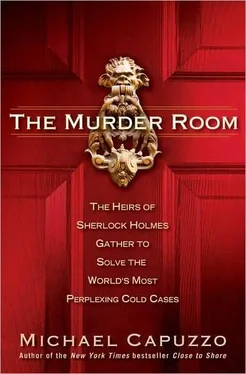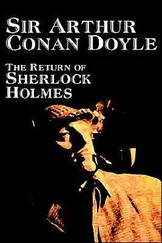They’d been hammering away at Keefe now for more than an hour, watching the green digital sea whip into a frenzy, and Keefe was weakening. Fleisher looked over at Gordon and knew he was thinking the same thing: The guy’s bombing the test as bad as anyone, and his guard was down.
Fleisher stared hard at Keefe. It was time to go in for the kill.
“You blew it,” he said. “Your charts are some of the clearest ever. And they got the DNA. You’re doomed.”
Confronted by Fleisher with the overpowering evidence, Keefe seemed to lose the last of his composure. He was off balance, ready to drop. We could get a confession in two minutes, Fleisher thought.
Fleisher glanced at Gordon, who nodded his assent. Despite their drive to nail Keefe, their honor as VSMs was more important: Their role was to provide advice and counsel, “not steal anyone’s thunder.” Both men abruptly stood, told Keefe to stay seated, and left the room to find the cops.
Chief Conoline agreed his men would take it from there, finish what they started. He told Whitney and his partner to go back in. Fleisher asked what they thought of Keefe’s violent shaking when they watched through the observation window. The cops shrugged. They didn’t think anything. Nobody had been watching at the observation window.
Minutes later, the police adopted a new strategy. Whitney and his partner were joined by a uniformed officer said to know Keefe personally, and the three cops marched Keefe out of the small interrogation room and into a large, comfortable conference room and shut the door. Gordon and Fleisher exchanged puzzled looks. Twenty minutes later, with no confession emerging from the new room, Gordon couldn’t stand it any longer. He walked up to Chief Conoline and said, “I’m going in.” The chief nodded OK.
As Gordon opened the door, he saw the problem right away. Four faces around a long conference table turned to the huge bald man with the intense blue eyes. The room set-up is horrible, he thought.
Keefe was sitting nonchalantly at one end of the table, leaning close to the table. He was calmly smoking a cigarette, with an ashtray in front of him. He’s too comfortable, Gordon thought. He looks like he’s about to have dinner.
Keefe was using the expanse of table as a barrier to protect himself. “There can be no barriers between you and the suspect,” Gordon noted later. “You have to be in his face.”
Whitney was seated at Keefe’s left, going through a pile of photographs of Brooks’s corpse. One by one the officer showed Keefe the gruesome photographs of the bloodbath, as if their horror held great power. He told Keefe the police thought he was involved. Keefe was calmly shaking his head no. The uniformed cop who knew Keefe was on his right side, sitting up on the table nodding. “We think you were involved.”
The third cop sat opposite the suspect far across the long table, nodding his agreement, too.
Keefe drew on his cigarette, tipped it into the ashtray, and said coolly, “No, you got the wrong guy.” His eyes went from man to man.
Gordon knew that Keefe couldn’t be “induced by guilt and remorse into a confession.” Walter had advised the Vidocq agents and police not to even attempt it. With an anger-retaliatory or AR, “all attempts to create remorse will fail spectacularly, just empowering the suspect ARs who aren’t capable of guilt,” Walter said. “They’re not like you and me.”
Walter gave the example of a classic AR case he had worked of a lovers’-lane killer in upstate New York. The murderer viciously attacked a young couple, raped the woman while the boyfriend watched, then pumped twenty-five bullets into both of them. Arrested within an hour of the slaughter, the killer was sitting in the back of the police car en route to the police station, drenched in his victims’ blood, when he fell asleep. He was tired. “Anyone can understand it,” Walter said sarcastically. “He’d been very busy. It was a long day. Typical AR-absolutely no guilt.”
“You can’t show them photos of the killing and expect to weaken them into tender remorse,” Walter said. “These guys are euphoric half an hour to an hour after the killing! It’s a big relief, and that hardens into a certainty that ‘the bitch deserved it’! A guilt or shame-driven attack backfires. Lacking any such feeling he grows cooler and more powerful, more sure of his web of lies.”
Walter thought police were “always too hyped up about getting a confession. I’d rather establish fifteen different points of inconsistency in a perp’s story, fifteen lies, than one confession that can be overturned.” Yet with an AR killer, “the trick to a confession is to attack their weakness, get them off guard, then incite rage-reproduce the out-of-control anger that led them to commit murder in the first place.”
Gordon asked the cops to leave the room, then went to work. He walked swiftly to Keefe at the end of the table, grabbed a chair with one hand and plunked it down on the suspect’s right side, invading his space. Keefe turned to face Gordon. The large bald head leaned in, inches way. Gordon’s blue eyes looked fierce, and he talked fast.
“I just gave you the polygraph test, and you can tell them anything you want, but you and I both know you did it,” he said. He let that sink in a moment. “I just have one question. Did you kill her for drug money, or was it a lovers’ spat and she came at you with a knife and you defended yourself? The clock is running and you don’t have any more time.”
Keefe said, “Neither.”
Gordon’s eyes flared. “Listen, don’t insult my intelligence.”
“Neither.”
Gordon scowled. “OK, if you’re telling me it’s neither, I know you’re lying. Therefore I have to assume it’s the worst-case scenario: You killed her for the drug money. There’s no reason to talk to you anymore.”
Gordon propelled his bulk from the chair, stood up, and walked out, shutting the door behind him.
As Gordon emerged, the chief sent Whitney and his partner back in. The young cops were itching to close the case they had worked so hard on. Meanwhile, Gordon conferred with Fleisher. It was time, the two Vidocqeans agreed, to use the technique Fleisher called “The Everything Must Go Sale.” Getting a confession was the ultimate sales job, Fleisher said.
“You’re convincing a guy that it’s better to confess and go to jail for twenty years than to say nothing and walk free,” he said. “It’s the all-time sale. You’re convincing him he needs the very last widget the company has made, when in fact there are seven million more gathering dust on the shelves. Time is everything. You gotta act now; the clock is ticking.”
He and Gordon discussed possible approaches. “We have DNA evidence,” Fleisher suggested, “and if you don’t tell us what really happened by midnight, we’re going to have to go with it. We’re going to have to nail you.”
Gordon looked at his watch. They had less than a half hour to go. Whitney and his partner were still in the interrogation room with Keefe, getting nowhere. Gordon grabbed the biggest guy in uniform he could find, a sergeant, and pulled him aside. “I want you to go into the room and say, ‘Mr. Gordon came out, he says you did it, we don’t want to talk to you anymore,’ and walk out.” The sergeant went in, made his announcement, and came out.
Less than a minute later, patrolman Whitney came out of the interrogation room, grinning widely. He’d gotten the confession. “Keefe confessed. It was a lovers’ spat. He says he was trying to defend himself.” The suits and uniforms congratulated him as cheers filled the hallway.
Gordon quietly pulled the young officer aside. “I want you to go back in and take his cigarettes from him, turn your chair so you’re parallel at the table, right across from him, and tell him, ‘Bullshit. There’s no way a woman gets stabbed twenty times, suffocated, and beaten; it’s not gonna work as self-defense.’ ”
Читать дальше












